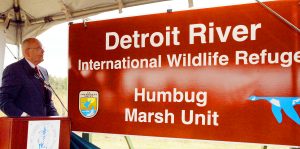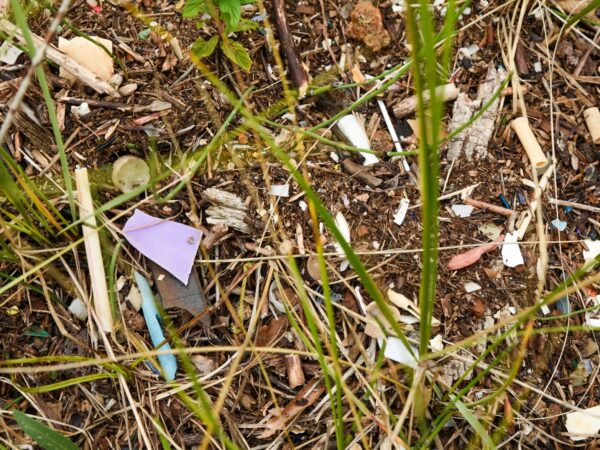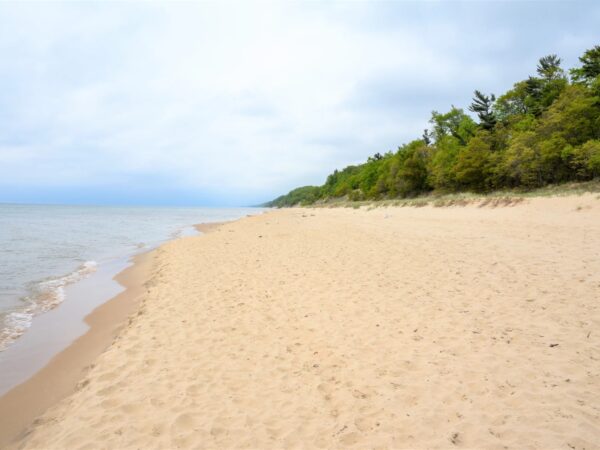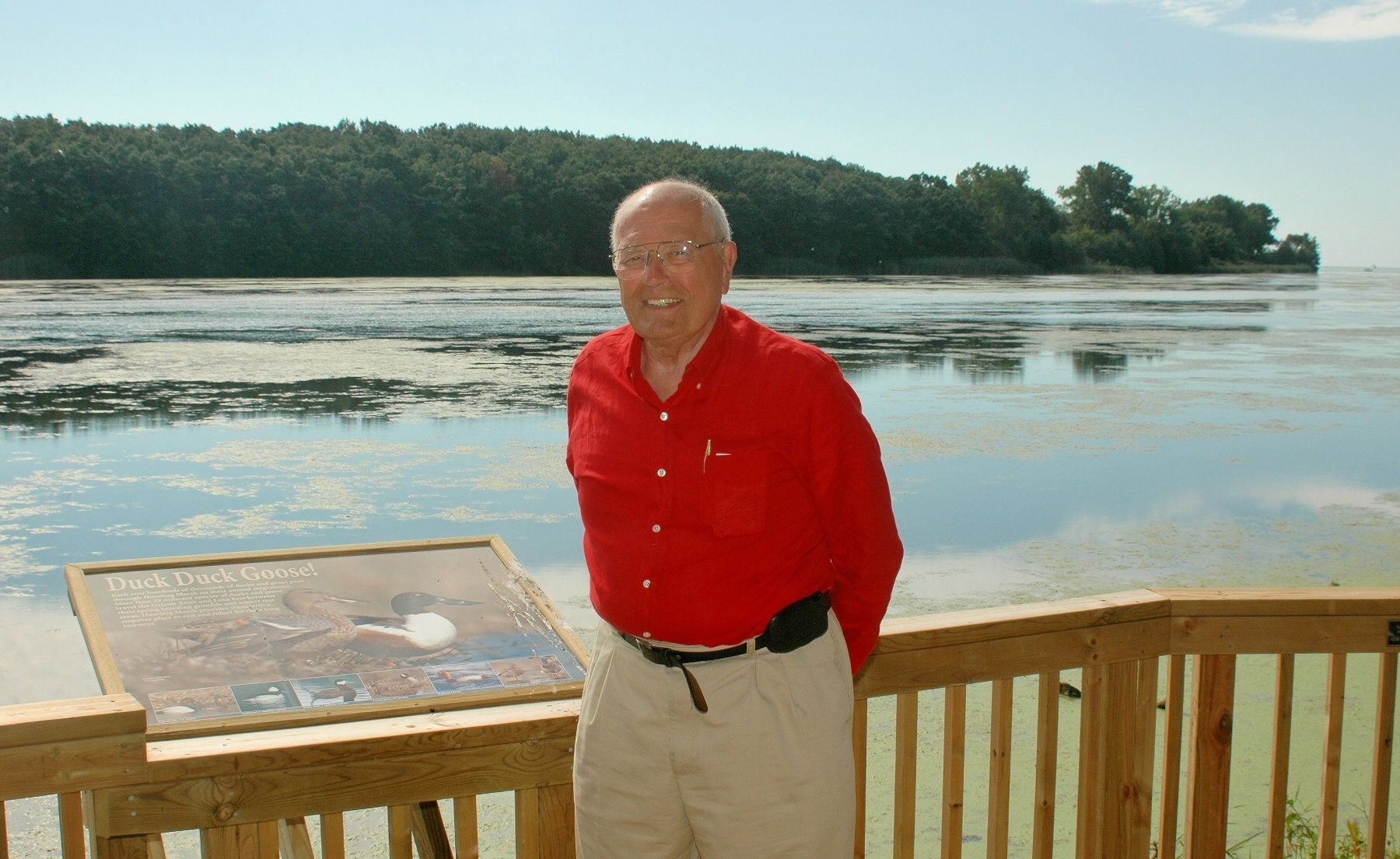
“Always a lover of the great outdoors”
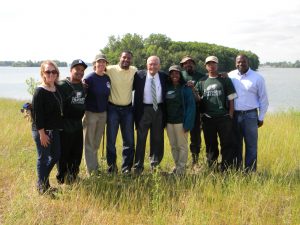
John Dingell with Greening of Detroit work crew at Refuge Gateway in Trenton, Photo by Detroit River International Wildlife Refuge via John Hartig
After a rainstorm nearly four decades ago, I was with Congressman John Dingell and some other local leaders on the concrete banks of the Rouge River in Melvindale. Raw sewage was floating on the surface, and hydrogen sulfide gas was bubbling up from the bottom of the river.
The river was truly appalling, and it smelled like rotten eggs. The Congressman saw firsthand how that raw sewage was being discharged from 168 combined sewer overflow points in the Rouge River, how all the oxygen had been used up in the river through decomposition of raw sewage, and how all the fish, including pollution-tolerant carp, were dying.
Dingell went back to Washington D.C. and secured $350 million of federal funding that was matched with $700 million of local funding to fix the problem. Today, the Rouge River is a model for watershed cleanup and protection, river-dissolved oxygen concentrations have improved substantially, and pollution-sensitive invertebrates and fish have returned.
John D. Dingell, Jr., 1926-2019
Born in Colorado, Dingell learned to be an outdoorsman and public servant from his father: Congressman John D. Dingell, Sr. After his father died in September 1955, the 29-year-old son won a special election that December to fill the seat. He went on to win re-election 29 times to the U.S. House of Representatives – no small feat for any politician.
Throughout his life Dingell was a congressional page, a park ranger, a Second Lieutenant in the U.S. Army during World War II, an assistant county prosecutor, and always a lover of the great outdoors.
He grew up fishing and hunting in and along the Detroit River and western Lake Erie. Throughout his life he saw first-hand what we, as society, had done to “skunk up” the waters in our backyard. Dingell’s love of the outdoors and his determination to do everything he could to clean up these waters for both people and wildlife led him to champion clean water and conservation in Washington, D.C.
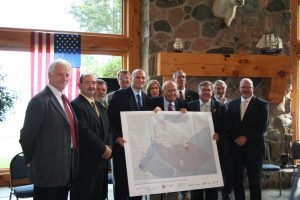
John Dingell with Canadian partners celebrating expansion of the refuge in Canada, Photo by Detroit River International Wildlife Refuge via John Hartig
Another great memory I have of him is from back in 2000 when Dingell got together with his good friend then-Canadian Deputy Prime Minister Herb Gray and corporate executive and Greater Detroit American Heritage River Initiative Chairman Peter Stroh to identify what they could collectively do for conservation and outdoor recreation in southeast Michigan and southwest Ontario.
All three cared deeply about the region. They brought together a group of U.S. and Canadian scientists, natural resource managers, and nongovernmental organization representatives who prepared a conservation vision for the Detroit River ecosystem.
Dingell took this conservation vision and molded it into legislation that he got passed through the U.S. House and Senate and signed by the president in December 2001 – creating the Detroit River International Wildlife Refuge.
Today, it is a model for bringing conservation to cities, making nature part of everyday urban life, and establishing public-private partnerships for conservation and outdoor recreation. The refuge now has over 18,700 acres of land in southwest Ontario and southeast Michigan managed for conservation and outdoor recreation in a metropolitan area with nearly seven million people living in a 45-minute drive.
Extended Influence
Throughout his nearly six decades of service in the U.S. House of Representatives, Dingell became a master of legislative deal-making. He was an honorable man who fought with all his might for the public good. For 14 years he chaired the powerful House Energy and Commerce Committee, which oversees industries from banking and energy to health care and the environment. Because of his incredible influence and effectiveness he frequently was called “Lion of the U.S. Congress.” Dingell’s passion for conservation of natural resources and outdoor recreation, keen legislative skills, and unwavering support for public service were key factors that made him so successful.
But his influence extended way beyond the Detroit metropolitan area. He was an author of the Clean Water Act, the Endangered Species Act, the Marine Mammal Protection Act, the Safe Drinking Water Act, and more.
From 1965 to 2014, he served on the Migratory Bird Conservation Commission that championed the protection, enhancement, restoration, and management of nearly 14 million acres of migratory bird habitat. Today, waters in the United States are cleaner, the birds, fish, and other critters are safer, and all of us have beautiful National Park Service sites like River Raisin National Battlefield Park and beautiful national wildlife refuges like the Detroit River International Wildlife Refuge where we can recreate, reflect, and be inspired with a sense of wonder — all because of John Dingell.
Featured Image: John Dingell at Humbug Marsh, Photo by Detroit River International Wildlife Refuge via John Hartig
Editor’s Note: Before becoming a contributor for Great Lakes Now, Dr. John Hartig served 14 years as Refuge Manager for the Detroit River International Wildlife Refuge.
2 Comments
-
Thank you for the great reminder
Let’s keep the momentum going in his honor, and for the benefit of all -
Congressman Dingell co-sponsored the 1950 Federal Aid in Sport Fish Recreation Act, or Dingell-Johnson Act. At Cornell University in 1957-61 a D-J research assistantship provided financial support for my dissertation research on fish in farm ponds. What I learned I subsequently applied to the Great Lakes. Belated thanks to Congressman Dingell.


